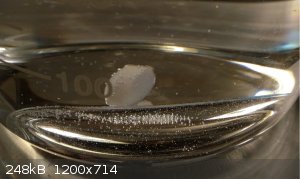
ChemistryGhost - 20-2-2018 at 17:59
Hello!
I was wondering about a way to make gallium (III) chloride.
Maybe reacting gallium metal with nitric acid to make gallium nitrate.
Then heating to 250 degrees celsius to decompose the gallium nitrate to gallium oxide.
Then reacting the gallium oxide with hydrochloric acid to make gallium trichloride, also known as gallium (III) chloride.
Maybe reacting gallium metal and trichloroisocyanuric acid would work.
Reboot - 20-2-2018 at 18:03
Unless I'm missing something, you should be able to prepare it directly (by reacting gallium with hydrochloric acid). HCl does attack gallium,
although slowly (so you might have to stick it out of the way for a few months while it does its magic.)
Molten gallium bubbling in HCl:

Melting it didn't seem to greatly affect the reaction speed. It took a long time to go to completion, but unless it decomposes when I try to boil
off the acid/water, I've got my GaCl3. :-) (If it does decompose, I'll crash it out with some alcohol or such.)
[Edited on 21-2-2018 by Reboot]
j_sum1 - 20-2-2018 at 18:09
I don't have specific knowledge here. But there are a couple of interesting ideas on Wikipedia.
You could react gallium directly with Cl2. You might want to look at my video on gold trichloride and adapt my setup. https://www.youtube.com/watch?v=0AB56Z0rTKM
Wikipedia also says that Ga reacts slowly with HCl. You might consider heating and/or adding some peroxide to help things along. Alomg those lines
adding a solvent immiscible with water and using some strong stirring might also help by removing the products as they are produced. (Ga2Cl6 dissolves
in a wide range of organic sovents.)
Boffis - 21-2-2018 at 09:32
How similar is gallium chloride to aluminium chloride?
What I am getting at is there a big difference between anhydrous gallium chloride and the hydrated material prepared under aqueous conditions? Can the
deliquescent hydrate be dehydrated without undergoing hydrolysis in the same way aluminium chloride hydrate does?
Melgar - 24-2-2018 at 02:29
Gallium + hydrochloric acid + H2O2 will often result in an exothermic runaway, it goes that fast. Or gallium and aqua regia, if peroxide isn't
something you have on hand. Evaporating a solution of a metal dissolved in aqua regia tends to leave the chloride salt behind exclusively. I'm not
sure if this is always true, but it's been true for every metal I've done this with.
ChemistryGhost - 26-2-2018 at 17:54
The hydrated form of gallium (III) chloride is fine.
It doesn't have to be anhydrous.
